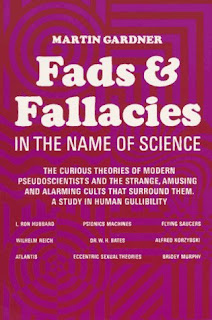 Fads and Fallacies in the Name of Science - Martin Gardner - Book Cover
Fads and Fallacies in the Name of Science - Martin Gardner - Book Cover
Fads & Fallacies in the Name of Science was written in 1952 and revised in 1957 by the American mathematics and science writer
Martin Gardner. The book’s 26 chapters catalog wacky ideas and the cranks and pseudo-scientists who put them forward. The book reminds us over and over again of how scientific skepticism (or any skepticism for that matter) is a skill that we have to practice daily and diligently.
To be honest, the book was a bit hard to read in two respects. First, you are reading about American fads and fallacies of more than 50 years ago and we have 50+ years of knowledge to know a little bit more about what is correct and what is crap. Reading about people who tried to pass off what we know today as crap as correct can be a little tiring. It seems not worth the effort, but you must keep reminding yourself that we are not safe today as we have our own fads and fallacies and cranks who peddle them. Use the book as a pattern of what to look out for. To that point, Gardner comes up with “five ways in which the sincere pseudo-scientist’s paranoid tendencies are likely to be exhibited.
(1) He considers himself a genius.
(2) He regards his colleagues, without exception, as ignorant blockheads.
(3) He believes himself unjustly persecuted and discriminated against.
(4) He has strong compulsions to focus his attacks on the greatest scientists and the best-established theories.
(5) He often has a tendency to write in complex jargon, in many cases making use of terms and phrases he himself coined.”
The second respect in which the book is difficult to read is that you are dealing with crazy, inaccurate, and often clearly wrong ideas and it’s hard to keep straight the ideas, names and places. So, all I can suggest is that you read a chapter here and there as needed. I came across the book because I first encountered the idea of “
the map is not the territory” by Alfred Korzybski (1879 – 1950) while reading, of all things,
My Life in France by Julia Child. Then I ran across one of Korzybski’s crazy
diagrams that looks like a strange art project and thought wow, there must be something here. But by chance I also read that Gardner should be consulted about Korzybski. So consult I did. Chapter 23,
General Semantics, Etc. deals with Korzybski and his ideas which I think spared my sanity so as I did not plunge head first into Korzybski’s impressive sounding
Science and Sanity.
Upton Sinclair
One character, who pops up many times throughout
Fads & Fallacies, is the American activist author
Upton Sinclair (1878 – 1968). Sinclair wrote the 1906 novel
The Jungle exposing the corruption of the meatpacking industry in the early 20th century. It seems that Sinclair didn’t meet a fad or crazy idea that he didn’t throw his whole self behind with considerable energy. In Chapter 17,
Medical Quacks, we learn that Sinclair was as vocal supporter of the obviously fraudulent American doctor
Albert Abrams (1863 – 1924). In a note accompanying the chapter, Gardner notes that
H.L. Mencken (1880 – 1956) in
Prejudices, Vol. 6 held that “the same rebellious impulses that make a political radical too often find similar outlets in quack medical opinions.” It reminded me a bit of the
Salem Hypothesis – that there is a correlation between subscribing to creationism and working in an engineering discipline. (Developing the relationship is left as an exercise to the reader.)
In Defense of Organic Farming
In Chapter 18,
Food Faddists, Gardner covers questionable ideas such as
Rudolf Steiner and
Anthroposophy and narrowly focused ideas like Fletcherism - “nature will castigate those who don’t masticate”. Lumped in are some ideas that have proven themselves out today. For example,
organic farming mentioned in the chapter comes in for some scorn from Gardner. However, today organic farming is accepted as a viable agricultural practice. Even ideas from folks like
Gayelord Hauser (1895 – 1984), a self-styled American nutritionist and Hollywood dietician, gets the last laugh in that his ideas of avoiding sugar and gluten have become more mainstream as well as finding support in research.
06/02/2010 - Update
See the Comments for further discussion of General Semantics.
10/13/2021 - Recommendation for a related book
Wow, I can't believe it's been over 10 years since I read Fads & Fallacies and many of the fads and fallacies are still going strong.
Good Thinking reminded me a lot of
Fads & Fallacies. Both books treat topics of not-so-good and downright bad thinking and reasoning. We wonder: have we made any gains in critical thinking, on average, if that can even be measured? Is good thinking only the domain of a fraction of society? Does that fraction change in time? We ask given the given recent news on people proudly and dangerously rejecting sound vaccine science in the name of freedom, "trust", and a host of other unreasonable reasons.












